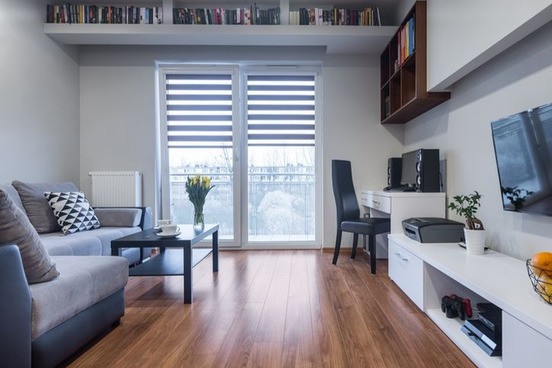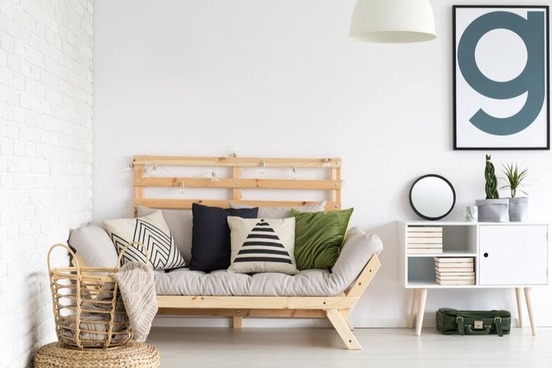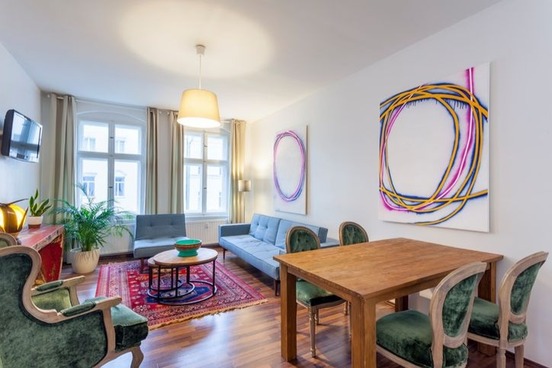
Penthouse
In Middle English, pentis meant primarily "a shed or roof attached to and sloping from a wall or building." Early evidence of the word includes an anonymous metrical sermon from around 1325: "Thar was na herberie / To Josep and his spouse Marie, / Bot a pendize that was wawles, / As oft in borwis tounes es." (There was no shelter for Joseph and his wife Mary, except a lean-to that was wall-less, as is frequent in borough towns.) Pentis is derived, through Middle French and Medieval Latin, from Latin appendix, meaning "appendage" or "supplement." (A direct borrowing from Latin gives English appendix in its various senses.) Thus, a pentis was a smaller building or structure attached to a larger one.
It was widely—though mistakenly—believed that pentis was related to Middle French pente, meaning "slope," and this belief was very likely encouraged by the fact that many such structures did in reality have sloping roofs. The beginning of the word thus being supposedly accounted for, its second syllable was then altered by folk etymology to -house (it helped that stress was on the first syllable of the word).
A subsidiary structure on the roof of a building to cover a stairway, a water tank, air-conditioning equipment, and the like is still called a penthouse, as is a luxurious and expensive top-floor apartment that commands a panoramic view—a common sense of the word today that was developed in the late-19th century.

Condominium
When we hear the word condominium, we usually envision a luxurious and spacious dwelling a bit larger than an apartment. But luxurious living in a residential community was far from the mind of Bishop Gilbert Burnet when he wrote around 1715 in his History of His Own Time, "The Duke of Holstein began to build some new forts ... this, the Danes said, was contrary ... to the condominium which that king and the duke have in that duchy." At that time, the word carried a very different meaning.
The word condominium itself comes from Latin com-, meaning "with, together," and dominium, meaning "domain." In Bishop Burnet's time, the term was applied especially to joint sovereignty exercised by two or more nations. A more modern example of this sense is in a passage from India International (1951): "In the present shape of things, Egypt still has a voice in the Government of the Sudan which is known as a 'condominium.'"
It was not until the mid-1900s that we began using the word (which was promptly nicknamed condo) in its more familiar sense "individual ownership of a unit (as an apartment) in a multiunit structure or a unit so owned." Since then, condominiums have sprung up all over the U.S. and in other lands, and they have become something of a symbol of members of the upward middle-class. An article in a 1983 issue of The Geographical Magazine describes the modern phenomenon known as the condominium: "Condominiums are simply a block of flats or a development of linked town houses where the individual owns his or her own unit outright while having a share of the joint ownership and responsibilities of the common parts, be they structural frames of the building, the lifts, boilers, swimming pools and gardens."
In recent years the word has even spread to the world of animals. A tower structure for cats to climb and play on has been referred to as a "kitty condo," and a 1978 issue of Massachusetts Wildlife takes the condo craze a step further, describing a woodchuck's burrow as "a fantastic condominium providing free shelter for the woodchuck itself as well as skunks, snakes, rabbits and box turtles."

Crib
Crib is an Old English word akin to Old High German krippa, the word for a manger—or rather, the trough in a stable designed to hold food for livestock. Over the centuries, crib has been applied as a name for various types of enclosures resembling the structure, such as a stall for animals, a baby's bed with high slatted sides, a storage bin, and a small room or dwelling—which goes back to William Shakespeare's time.
Why rather, sleep, liest thou in smoky cribs, / Upon uneasy pallets stretching thee, / And hush'd with buzzing night-flies to thy slumber, / Than in the perfum'd chambers of the great, / Under the canopies of costly state, / And lull'd with sound of sweetest melody?
— William Shakespeare, Henry IV, Part 2, 1600
It is in the 17th century that the familiar sense of crib for a baby's bed arrives—no doubt, conceived from the slatted enclosures and containers found around the farm.
During the 19th century, people added on to the "dwelling" sense of the word. In New Zealand, crib was established as a designation for a small house at the seaside or at a resort. In American slang, early-2000s MTV viewers are fully aware that the word came to refer to a general place of residence (as a room, house, or apartment) or a place of entertainment of the ill-repute kind—brothels, in particular.
This is all right. Two minutes from your crib, ten minutes from your work.
— Jackie Brown, 1997There was less talk of the girls in the Orleans street cribs and a marked increase in daily drinking.
— Studs Terkel, Hard Times, 1970
About the beginning of the 17th century, crib began being applied as a verb meaning "to confine" or "to put into a crib."
But now I am cabin'd, cribb'd, confin'd, bound in / To saucy doubts and fears—But Banquo's safe?
— William Shakespeare, Macbeth, 1605-06
It then developed criminal meanings of "to steal," "to cheat," and "to plagiarize." Often such acts of cribbing are of the academic sort: "cribbing the answers on a test," "cribbing on an exam," or "cribbing from an author's work." The noun crib has corresponding senses related to theft, cheating, and plagiarizing. Teachers: be on the lookout for the "crib."

Pad
Pad is a common word that dates to the 16th century, but etymologists can't find any record of its parentage. What is known is that pad is a name for a cushion or other similar soft object as well as the underside of a pet's foot, a set of papers, a bed, and living quarters.
In 18th-century American cant, pad was furnished with its "bed" sense.
You gotta have a date with me before you fall in my pad, darling.
— Chester Himes, If He Holler Let Him Go, 1945
In the 20th century that sense of pad extended to the place furnished with a bed—that is, pad became another word for a bedroom and then for an apartment or house, as in bachelor pad.
Pads were places to sleep, but extracurricular activity often occurred at the "pad."
Pad originally applied to the bunk in which opium smokers lie, was utilized to form tea-pad, a hide-away of marijuana smokers, and has now come to mean either "bed" or "apartment."
— Tomorrow, August 1947For the beatniks, Ibiza's greatest charm is that it is cheap—less than $1 rents a pad for the night, and glass of absinthe costs only 2 cents.
— Newsweek, 30 Mar. 1964Interestingly, though the hippy student professes little concern for grades, his marks tend to be above average. … They are willing to live in poverty, ready to share puff and pad, and they are able to follow their own convictions in the face of ridicule and scorn.
— Robert E. Kavanaugh, Psychology Today, October 1968
And people tended to "crash" at their and other people's pads, giving way to crash pad for a place to sleep temporarily or for the night, depending on the crash.

Digs/Diggings
If you don't know that digs means where you live, the same as pad and crib, there's no hiding it, man, you're over 25!
— Reba and Bonnie Churchill, The Springfield (Massachusetts) Sunday Republican, 12 Nov. 1967
Digs is derived from the earlier term diggings, which shares the same meaning of "living quarters" or "lodging." This sense of diggings goes back to the 19th century.
Look here, Ned, I reckon it's about time we should go to our diggings; I am dead beat, and you don't look as if you could keep out of bed much longer.
— Joseph C. Neal, Charcoal Sketches, 1837She won't be taken with a cold chill, when she realises what is being done in these diggings.
— Charles Dickens, Martin Chuzzlewit, 1843
Digs itself is spotted in print later in the century, and it seems fairly certain that it is a shortened form of diggings.
So where did diggings come from? Some theorists have asserted that the word in its "living quarters" sense arose during California's gold rush, but that clearly can't be true, since this sense was used years prior to the gold rush. It is worth noting, though, that in the 16th century diggings was being used in Britain to refer to a place where mining was taking place. A miner's diggings is, in essence, his abode. Perhaps, such association is the source of diggings meaning "living quarters," although exactly how the sense development may have occurred is not clear.

Joint
The origin of the common sense of joint indicating connection is articulate: in the 13th century, English borrowed Anglo-French joindre and its sense naming the point where two bones meet in the body and that sense was eventually generalized to include any point where two things or parts are joined. How joint came to refer to a dwelling in the 19th century, on the other hand, is a bit disjointed. One hypothesis is that the sense originated from the notion of adjoining rooms or buildings (say, an opium den attached to a bar). Another is that it comes from the joining together of criminals to do a job—the place where they gather being the "joint."
Whatever the case, by late 19th century, joint came to specify any sketchy or disreputable establishment or place of entertainment, such as gambling houses, nightclubs, bars, brothels, and opium dens—which possibly lead to the word's early-20th-century use for drugs and drug paraphernalia. First, joint designated a makeshift hypodermic syringe and then a marijuana cigarette.
The paraphernalia of a drug addict … consist of a hypodermic needle, an eye dropper, a spoon in which to make a solution of the drug, and, in the case of a "vein shooter," an old necktie to be used as a tourniquet. The whole outfit is called a "plant" or "joint."
— Bingham Dai, Opium Addiction in Chicago, 1937
Circa 1930s, joint is first recorded as a name for a prison.
Nowadays, when joint is used to refer to a place (such as an apartment, hotel, or restaurant), it often has a disparaging or ironic connotation; however, that is not always the case:
A number of cool joints have sprung up in Ipoh Gardens East, a commercial and residential area near the Aeon Mall. Tea Coffee Game opened among a drab row of businesses and office buildings. It has bright interiors, Ikea furniture and there's a utilitarian feel to it, but its conceit is the games found throughout—traditional board games like checkers and ludo as well as a video console.
— Sanjay Surana, The New York Times, 28 Feb. 2018

Shanty
In English, shanty can refer to a work song sung by sailors or to a crudely built dwelling or shelter, and each sense is linked to a different homograph. The first is a variant of chantey, a modification of French chanter, meaning "to sing." American writer Herman Melville provides an example of such a shanty in his 1849 semi-autobiographical novel Redburn: His First Voyage:
The white sails glistened in the clear morning air like a great Eastern encampment of sultans; and from many a forecastle, came the deep mellow old song Ho-o-he-yo, cheerily men! as the crews called their anchors.
The second homograph is believed to be from Canadian French chantier, meaning "lumber camp" or "hut," and earlier "a wooden supporting frame." This chantier is based on the Latin word for a trellis or rafter, cantherius. Both homographs sail into English in the 19th century.
Early print evidence of shanty for a dwelling is from both American and Canadian sources, which suggests that the word was used in speech for some time before it was written down.

Quarter
Quarter derives, via Anglo-French, from Latin quartus, meaning "fourth," and since at least the 14th century, it has been used to denote one of four equal parts into which anything is physically or mathematically divisible, from grain to phases of the moon, periods of time (e.g., hours, years, and seasons), currency, and pie.
By the 15th century, quarter, as well as its plural form quarters, came to denote position or place—in particular, regions and localities lying under any of the four divisions of the horizon conceived as corresponding to the cardinal points of the compass (north, east, south, and west).
This idea of sectioning areas into quadrants led to the senses of quarter denoting a district of a town or city occupied by a particular group or found notable for a conspicuous feature, such as the French quarter in New Orleans, Louisiana, or the Entertainment Quarter in Sydney, Australia.
In military jargon, quarters came to refer to the special place of residence appointed to soldiers. In time, that sense was extended to civilian lodgings and living quarters.
Another familiar military sense of quarter implies showing mercy. "To give quarter" originally meant to send a defeated enemy to "quarters" (i.e., back to base)—hence, showing mercy and sparing their life (usually with the intent of eventually getting a ransom for the prisoner). The negative expression "to give no quarter" took on a figurative meaning of showing no mercy or leniency in today's parlance:
Both teams were incredibly well matched. No quarter was given nor expected. Not an inch was given, every inch had to be taken.
— Rico S. Giron, The Las Vegas Optic, 15 Dec. 2017

Apartment/Flat/Studio
Apartment is a mid-18th century borrowing from French, and the French word is from Italian appartamento, a translation of Spanish apartamiento, which literally means "separation." The Italian noun is based on the verb appartare, meaning "to put aside" or "to separate." Originally, apartment referred to a suite or set of private rooms in a house or building occupied by a person or family. A visitor of a royal family, for example, might be accommodated with an apartment in the palace. Later, a single room was referred to as an apartment.
In time, the concept of a building consisting of separate residential multi-room apartments was realized, and in the late 19th century, people began renting such spaces in apartment buildings and apartment houses.
The corresponding word in British English for apartment is flat. The name is an alteration of the now-obsolete Scottish noun flet, meaning "floor" or "ground under one's feet." In the 19th century, flat came to be used as a variant for flet and additionally gained popularity as a word to denote a story of a house or building, and then a multi-room apartment situated on one floor.
You may also be familiar with a studio apartment or studio flat, which features a large open space originally intended for an occupant endeavoring in painting, drawing, photographing, or other artwork. The English word studio refers to the working place of an artist—that sense dates to about 1800—and is from the Italian name for a room used for studying.





